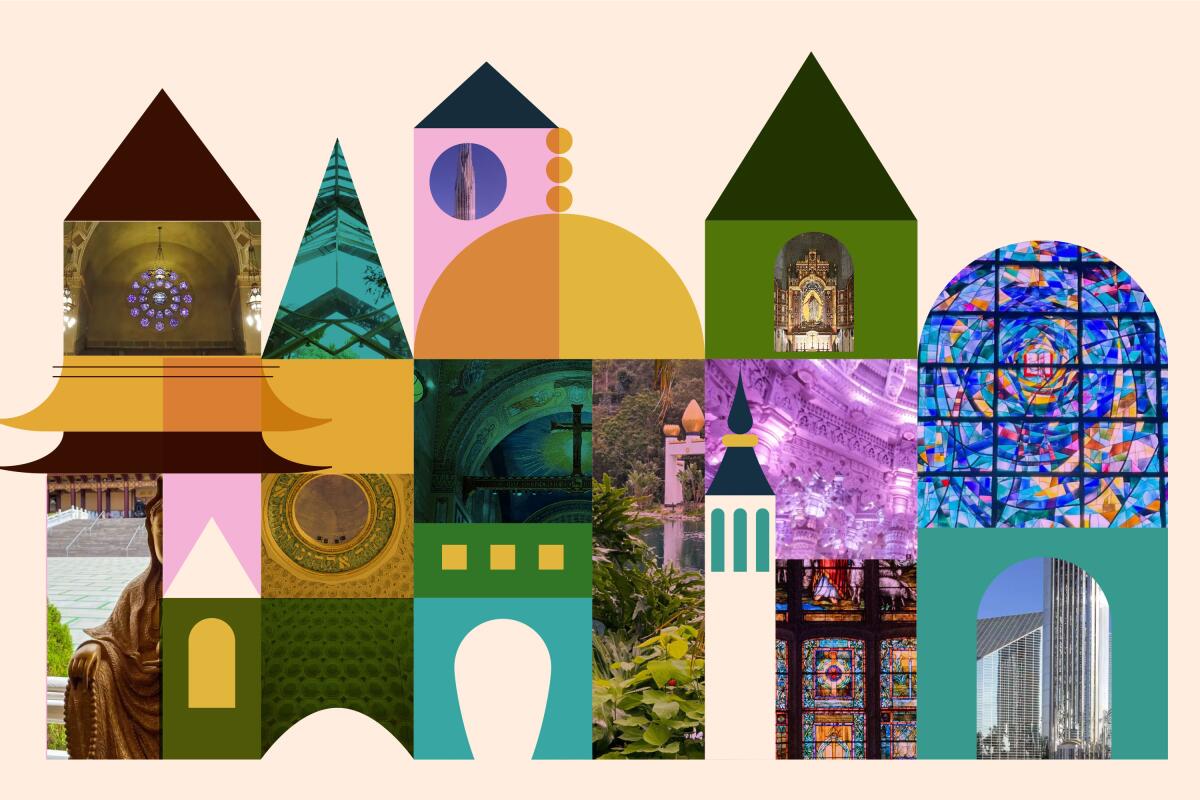Indigenous people hope removal of dams will heal Klamath River ecosystem
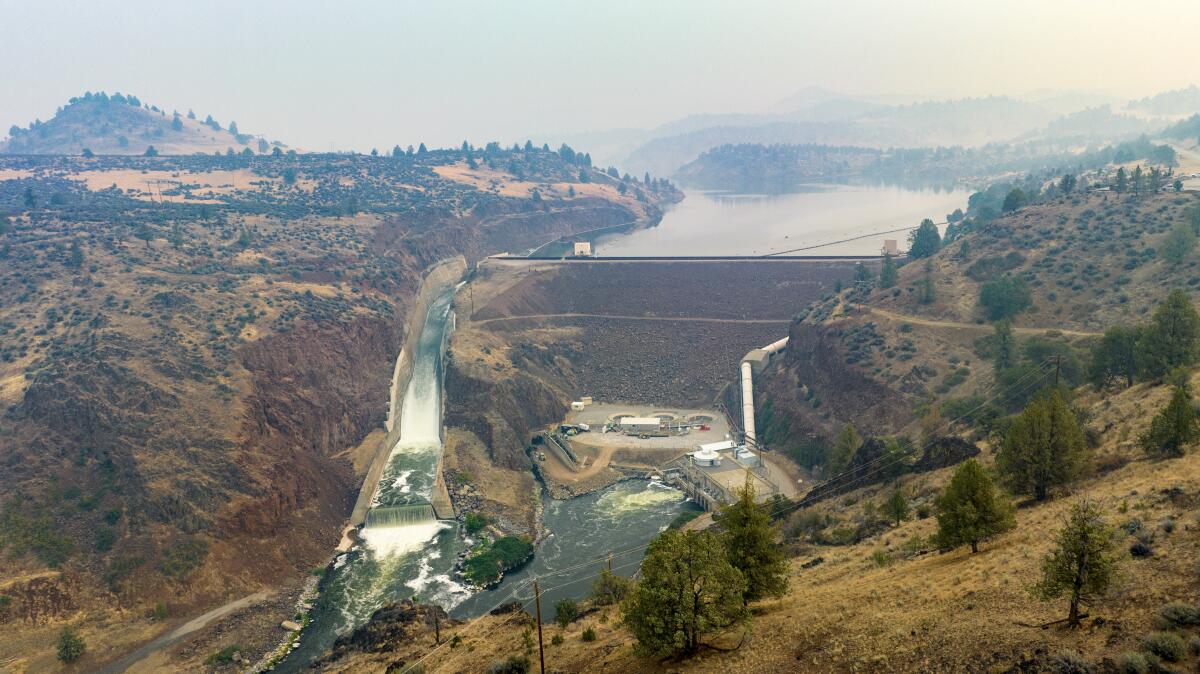
Good morning. It’s Tuesday, Oct. 10. I’m Ian James, water reporter at The Times, standing in to write today’s edition of Essential California. Here’s what you need to know to start your day.
- Indigenous people celebrate the removal of dams from the Klamath River
- Gov. Gavin Newsom signs major environmental bills
- 11 incredibly beautiful sacred spaces in Southern California
- And here’s today’s e-newspaper
Sign up for Essential California
The most important California stories and recommendations in your inbox every morning.
You may occasionally receive promotional content from the Los Angeles Times.
New hopes of healing on the Klamath River
In late summer and early fall, families usually gather along the Klamath River, drifting in boats, fishing with nets and smoking fish on sticks by open fires.
This year, however, the salmon population declined to such low numbers that leaders of the Yurok Tribe shut down their fishing season.
The dire state of the river has increasingly threatened the survival of tribal fishing traditions. But Indigenous people along the Klamath say they now have new hope that the river’s ecosystem can begin to heal, and that salmon will once again flourish.
The largest dam removal effort in history is underway along the California-Oregon border. One of four hydroelectric dams has been torn down, and three other dams are set to be dismantled next year.
For Indigenous leaders and activists who campaigned for years demanding the undamming of the Klamath, the changes represent a major victory — and an opportunity to strengthen their ancestral connection to the river.
I traveled to the Klamath with my colleagues Brian van der Brug and Albert Brave Tiger Lee to report on what the dam removal project means for people who have been immersed in the struggle for more than two decades.
At a Yurok community food garden by the river, we met Annelia Hillman, who told us how she and others began organizing protests following a 2002 fish kill, when tens of thousands of dead salmon filled the water.
“When we saw the fish starting to float down the river, we knew something was wrong. And then pretty soon, more and more fish came down,” Hillman told us. “The smell was this smell that you could never forget. It was just rotting carcasses.”
The grief of witnessing the fish kill became a pivotal moment for Hillman and many others. They saw the dams, which were built without tribes’ consent, as one of the primary threats to the river and their way of life. The dams have blocked salmon from reaching spawning areas for decades, and degraded the water quality, contributing to algae blooms and disease outbreaks among the fish.
“It’s really had a big impact on our river here, as far as the water quality, as far as fish runs — and for the people,” Hillman said. “The quality of the river, and having our water taken from us and dammed, has definitely affected our psychological health for our people. And we’ve seen that through the generations.”
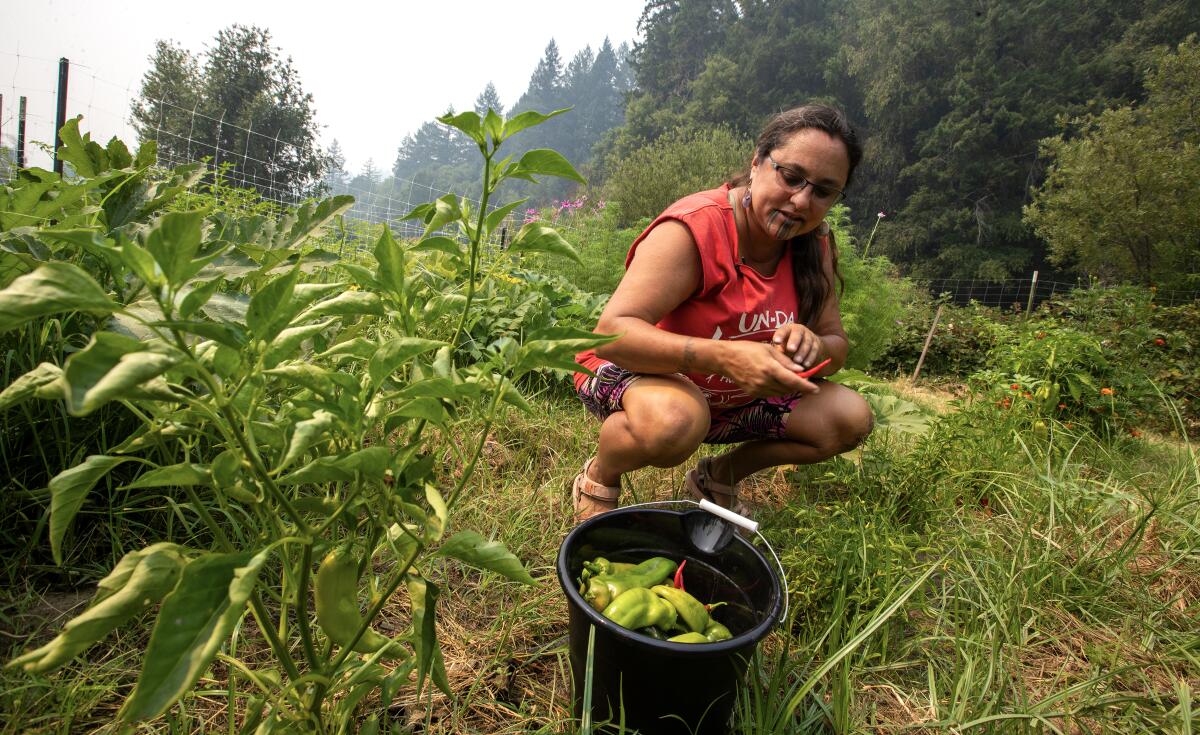
Hillman is 48 and works as a traditional food coordinator with the tribe. She is also a basket weaver, and often spends time along the river collecting plants. She said when she walks by the river, it’s like “finding my balance.”
“In the beginning, we thought dam removal was impossible. But we were going to tackle it anyway. … And really, that persistence paid off,” she said. “It’s hard to take a moment and celebrate. But we really do need to celebrate this. It’s really huge.”
“I hope that this sends a message out that restoring the Earth back to her natural state is what we need for survival.”
Hillman explained that Yurok people feel a deep connection to the river’s fish, and a commitment to care for them.
“Without our salmon, we don’t exist,” she said. “We don’t exist without our purpose, and that salmon is our purpose.”
Once the dams come down, she said she hopes the salmon and the entire ecosystem will begin to rebound.
“It’s a very healing moment for us,” Hillman said.
“The dams on this river have been disruptive for all life,” she said. “So dam removal will hopefully restore that life, and those cycles and that process of life on the river.”
While Hillman spoke, a bald eagle flew past. On the other side of the river, a black bear appeared lumbering along the water.
We saw other signs of life along the river during our visit, including some salmon that jumped and splashed as the fish made their way upstream.
As you read our piece about the undamming of the Klamath, don’t miss this superb video produced by Times journalist Albert Brave Tiger Lee.
Today’s top stories
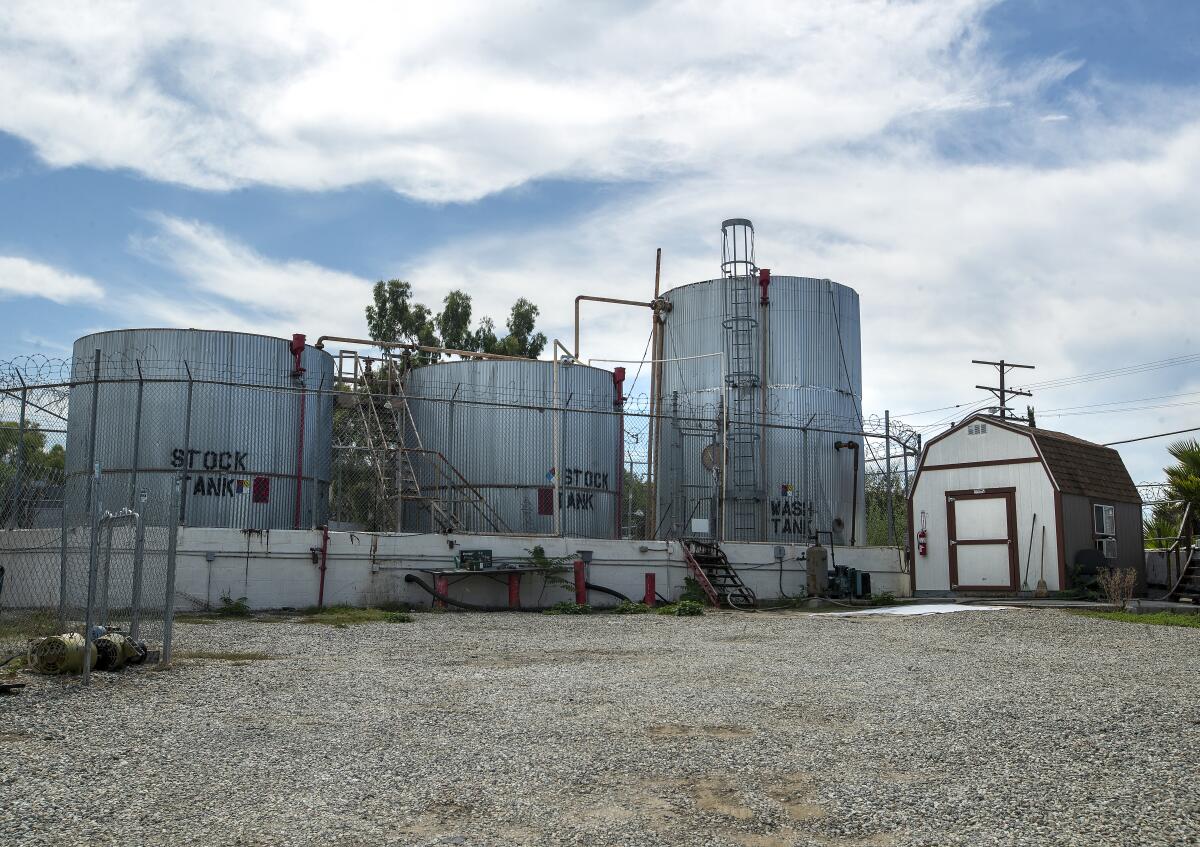
Updates from Sacramento
- Gov. Gavin Newsom signs bills to address unplugged oil wells in California and disclose corporate greenhouse gas emissions.
- Newsom signs legislation aimed at making rape kits more accessible to college students.
- Hoping to lower dropout rates, Newsom bans ‘willful defiance’ suspensions through high school.
- Newsom vetoes bill to expand worker layoff protections to contract labor.
Latest from the Senate
- Former Dodgers star Steve Garvey, a Republican, announces Senate bid for Dianne Feinstein’s seat.
- Facing a no-win situation, Newsom made a surprise decision with a Senate appointment.
Labor news
- Healthcare workers kick off a five-day strike at four hospitals over staffing shortages and labor practices.
- WGA members easily ratify a new contract to end a 148-day strike as anxieties loom.
SoCal sports
- Are the Athletics moving into Dodgers territory? Why Las Vegas feels true blue.
- L.A. names coveted five provisional sports it wants to add for the 2028 Olympics.
More big stories
- Couch surfing and living in cars. Housing insecurity derails foster kids’ college dreams.
- Space shuttle’s rockets will be trucked through SoCal roads Tuesday and Wednesday.
- What are those web-like clumps falling from the sky around the Bay Area?
- Nearly two years after she disappeared, family and friends are still searching. What happened to Heidi Planck?
- How Jelly Roll overcame addiction and prison to become the new (tattooed) face of country.
Get unlimited access to the Los Angeles Times. Subscribe here.
Commentary and opinions
- Opinion: I’m a rabbi. This is how I talked to my kids about the war in Israel.
- Jonah Goldberg: Who’s to blame for the Hamas attack on Israel? That debate is already going off the rails.
- Editorial: California’s transport spending doesn’t match climate goals.
- Kevin Baxter: For the second time in three years, a midseason managerial change has helped Orange County Soccer Club turn into a favorite for another USL championship.
Today’s great reads

A world away from Israel, L.A.’s Jewish community reels under vast sense of loss. Feelings of fear and helplessness were echoed by many Sunday in Los Angeles’ Jewish community, which was reeling from the deadliest attack in Israel in decades during what was supposed to be a holiday weekend of celebration. Streets in the Pico-Robertson neighborhood would normally be shut down this weekend for parties in honor of Simchat Torah, the Jewish holiday marking the completion of the annual cycle of the reading of the Torah. But this year, the mood was somber as police stepped up security in Jewish and Muslim communities alike.
Other great reads
- She was away when Hamas militants invaded her kibbutz and kidnapped her family.
- These Indigenous people are fighting to keep their languages alive.
How can we make this newsletter more useful? Send comments to [email protected].
For your downtime
Going out
- 🍾 At these bottomless brunches, if you chug it down and it comes back up, it’ll cost you.
- 🕌 11 incredibly beautiful sacred spaces in Southern California that inspire awe.
- 📰 Former Washington Post Editor Martin Baron will join the L.A. Times Book Club on Wednesday to talk about his new book, “Collision of Power.”
- 🍪 L.A. is in the middle of a cookie craze. The best ones to try now.
Staying in
- 📖 Foster Hirsch’s “Hollywood and the Movies of the Fifties” is as grand as the movie palaces it documents.
- 📚 Sensei Schwarzenegger? The Governator attempts a reboot with a pallid self-help book.
- 🍤 Here’s a recipe for rice noodle-crusted ‘coco’ fried shrimp.
- ✏️ Get our free daily crossword puzzle, sudoku, word search and arcade games.
And finally ... a great photo
Show us your favorite place in California! Send us photos you have taken of spots in California that are special — natural or human-made — and tell us why they’re important to you.
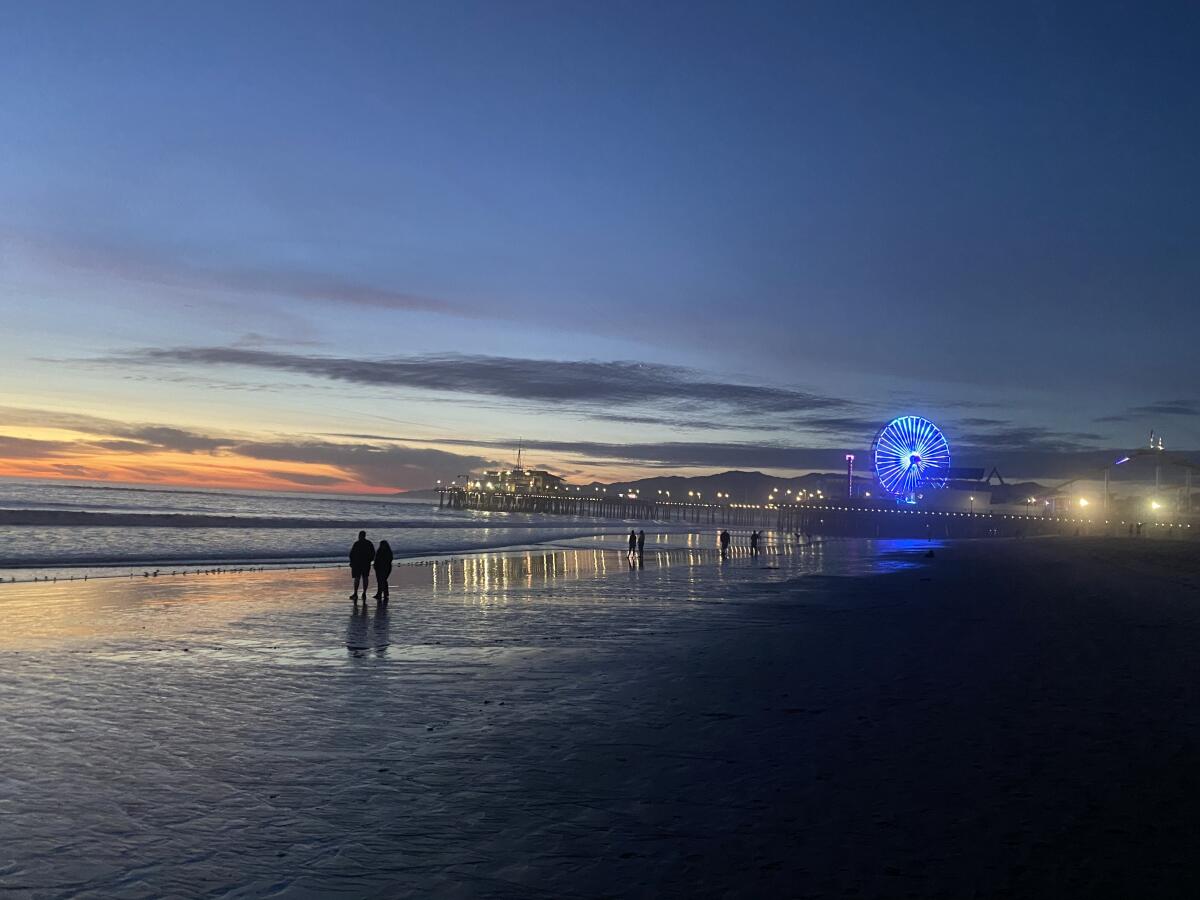
Today’s great photo is from Ron Graham of Pacific Palisades: Santa Monica beach and pier. Ron writes:
I have run many places in my many years as a former competitive long distance runner, but nothing compares to a run on the beach at dusk towards the iconic Santa Monica Pier.
Have a great day, from the Essential California team
Ian James, water reporter
Elvia Limón, multiplatform editor
Kevinisha Walker, multiplatform editor
Laura Blasey, assistant editor
Check our top stories, topics and the latest articles on latimes.com.
Sign up for Essential California
The most important California stories and recommendations in your inbox every morning.
You may occasionally receive promotional content from the Los Angeles Times.
